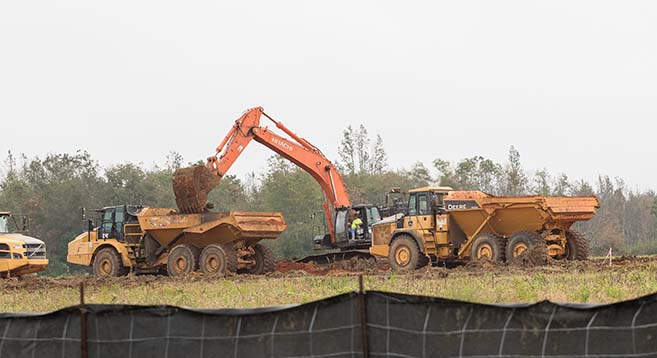
By DON FLETCHER
News Staff Writer
While lawyers and economic development officials worked to fix a small snag that has lain beneath the surface of a deal to construct a massive peanut shelling plant here, Atmore-based TripTek Construction’s heavy equipment operators worked to prepare the 84-acre-plus site for the $80 million structure.
“We’re doing the ‘dirt work’ already; it’ll probably take several months,” TripTek’s Dean Smith said of getting the tract level and ready for the state-of-the-art shelling plant. “We’ve been digging the topsoil down to the clay, and we’ve got us a little sand pit full of red-clay sand.”
The construction company has built an access road for its mammoth dirt-moving equipment and is chugging along at a steady pace. New stop signs have been installed at the curve on Industrial Drive where the road was built.
Meanwhile, a special meeting of the Atmore Industrial Development Board was held October 20 to make a sudden financing flare-up — overlooked 10 years ago — disappear.
City Attorney Larry Wettermark explained that the problem arose from the 10-year tax abatement granted Masland Carpets in 2000, or rather from the forgetfulness of the parties who initially brokered the deal.
“Typically, the way it works, the city gives a tax abatement from non-educational ad valorem taxes by Masland, through its subsidiary, The Dixie Group,” Wettermark explained. “The industrial development board would then give a mortgage on the property, but Masland would get a promissory note.”
The city’s legal counsel said everything went as planned, except the parties forgot to terminate the lease after the 10-year abatement period. An unidentified title company, making sure all involved property was unencumbered by debt, discovered that the final step had never been taken.
“After 10 years, the note was retired,” Wettermark said. “The abatement went away, and the property was conveyed back to Masland. Masland, through its subsidiaries, was financing its property. The title company took a look and didn’t see where the note had ever been canceled. It was something that should have been taken care of 10 years ago.”
Richard Maxwell, who chairs the industrial development board, had to sign some documents after the meeting to formally and finally put the matter to rest, after Sheilo Faircloth and Dr. Ulysses McBride each made and seconded one motion to take care of the two items necessary to eliminate the decade-old oversight.
AIDB board members Bob Jones and Jim Johnson were unable to attend the meeting, but Maxwell, McBride and Faircloth constituted a quorum of the five-member board, and the matter was settled.
